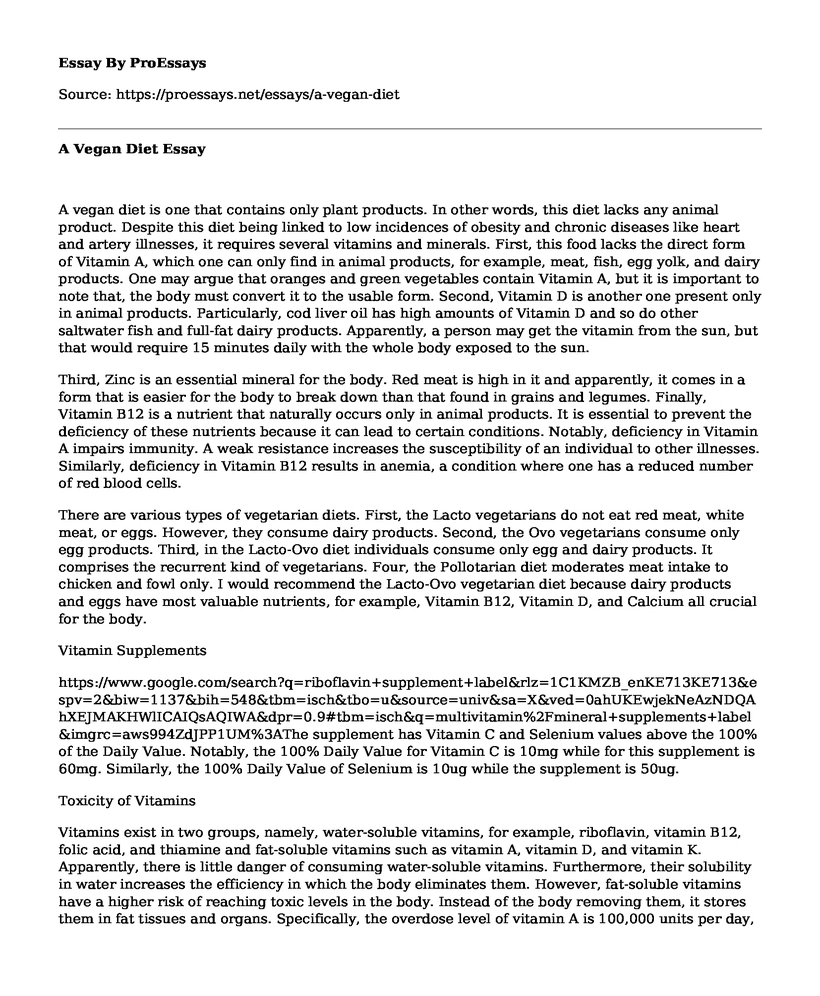A vegan diet is one that contains only plant products. In other words, this diet lacks any animal product. Despite this diet being linked to low incidences of obesity and chronic diseases like heart and artery illnesses, it requires several vitamins and minerals. First, this food lacks the direct form of Vitamin A, which one can only find in animal products, for example, meat, fish, egg yolk, and dairy products. One may argue that oranges and green vegetables contain Vitamin A, but it is important to note that, the body must convert it to the usable form. Second, Vitamin D is another one present only in animal products. Particularly, cod liver oil has high amounts of Vitamin D and so do other saltwater fish and full-fat dairy products. Apparently, a person may get the vitamin from the sun, but that would require 15 minutes daily with the whole body exposed to the sun.
Third, Zinc is an essential mineral for the body. Red meat is high in it and apparently, it comes in a form that is easier for the body to break down than that found in grains and legumes. Finally, Vitamin B12 is a nutrient that naturally occurs only in animal products. It is essential to prevent the deficiency of these nutrients because it can lead to certain conditions. Notably, deficiency in Vitamin A impairs immunity. A weak resistance increases the susceptibility of an individual to other illnesses. Similarly, deficiency in Vitamin B12 results in anemia, a condition where one has a reduced number of red blood cells.
There are various types of vegetarian diets. First, the Lacto vegetarians do not eat red meat, white meat, or eggs. However, they consume dairy products. Second, the Ovo vegetarians consume only egg products. Third, in the Lacto-Ovo diet individuals consume only egg and dairy products. It comprises the recurrent kind of vegetarians. Four, the Pollotarian diet moderates meat intake to chicken and fowl only. I would recommend the Lacto-Ovo vegetarian diet because dairy products and eggs have most valuable nutrients, for example, Vitamin B12, Vitamin D, and Calcium all crucial for the body.
Vitamin Supplements
https://www.google.com/search?q=riboflavin+supplement+label&rlz=1C1KMZB_enKE713KE713&espv=2&biw=1137&bih=548&tbm=isch&tbo=u&source=univ&sa=X&ved=0ahUKEwjekNeAzNDQAhXEJMAKHWlICAIQsAQIWA&dpr=0.9#tbm=isch&q=multivitamin%2Fmineral+supplements+label&imgrc=aws994ZdJPP1UM%3AThe supplement has Vitamin C and Selenium values above the 100% of the Daily Value. Notably, the 100% Daily Value for Vitamin C is 10mg while for this supplement is 60mg. Similarly, the 100% Daily Value of Selenium is 10ug while the supplement is 50ug.
Toxicity of Vitamins
Vitamins exist in two groups, namely, water-soluble vitamins, for example, riboflavin, vitamin B12, folic acid, and thiamine and fat-soluble vitamins such as vitamin A, vitamin D, and vitamin K. Apparently, there is little danger of consuming water-soluble vitamins. Furthermore, their solubility in water increases the efficiency in which the body eliminates them. However, fat-soluble vitamins have a higher risk of reaching toxic levels in the body. Instead of the body removing them, it stores them in fat tissues and organs. Specifically, the overdose level of vitamin A is 100,000 units per day, and that of vitamin D is 10,000units per day. The tolerable upper intake levels of these vitamins are not listed in the product above.
Various factors would influence the decision to use the above supplement. First, the nutrition information is important to consider. Furthermore, I would not want additional calories already available from my food intake, which would lead to weight gain. Second, the warning and allergy advice is essential information to influence my decision to use this supplement. However, I would not need this supplement because I get adequate vitamins and minerals from my daily dietary intake.
Vitamin Supplements and Exercise Performance
A vitamin supplement will enhance exercise performance only when consumed to correct a nutritional deficiency. Therefore, if the vitamin and mineral supplements are provided to eliminate a gap, they will result in better health and avail a foundation for better training and improved performance. Nevertheless, inadequate dietary intake of vitamins and minerals can impair exercise performance because it leads to suboptimal health.
Energy Balance and Physical Activity
According to my Nutrients Report, the Total Daily Caloric intake is 2247 Calories compared to a target of 2000 Calories. Accordingly, my status is over the required amount. Based on this information, if I continue with the average Total Caloric Intake my weight will increase. However, to prevent weight-gain, first I could reduce the amount of added sugars intake. Second, I could also minimize the amount of saturated fats that I consume per day.
According to the Physical Activity Report, my average rate of aerobic activity is 100 minutes while the report's weekly target time is 150 minutes. Similarly, my average rate of muscle strengthening activity is one day while the report's weekly target period is two days. Notably, I am below the required weekly target. The three components of energy expenditure are walking uphill, sweeping floors or carpets, and vacuuming. However, I can improve the energy expenditure for each of these elements by increasing my walking speed, cleaning the floors and carpets together, and vacuuming the house twice per week.
Cite this page
A Vegan Diet. (2021, Mar 04). Retrieved from https://proessays.net/essays/a-vegan-diet
If you are the original author of this essay and no longer wish to have it published on the ProEssays website, please click below to request its removal:
- Does Having Breakfast Affect a Student's Grade Point Average?
- Strength and Conditioning Coaches Involved With Football Essay
- Essay Sample on Importance of Football
- Essay Sample on Food Waste in Arizona
- Did McDonald's Act Ethically in Selling Products That it Knows Causes Obesity?
- Essay Sample on Football Coaches & Managers: A Historical Journey
- Free Essay Example on Paleo Diet







